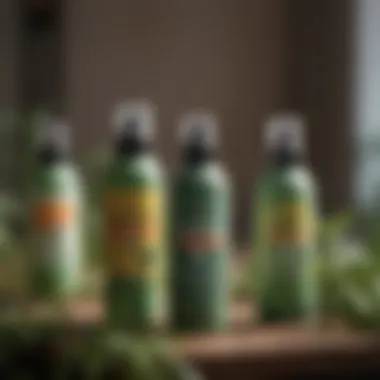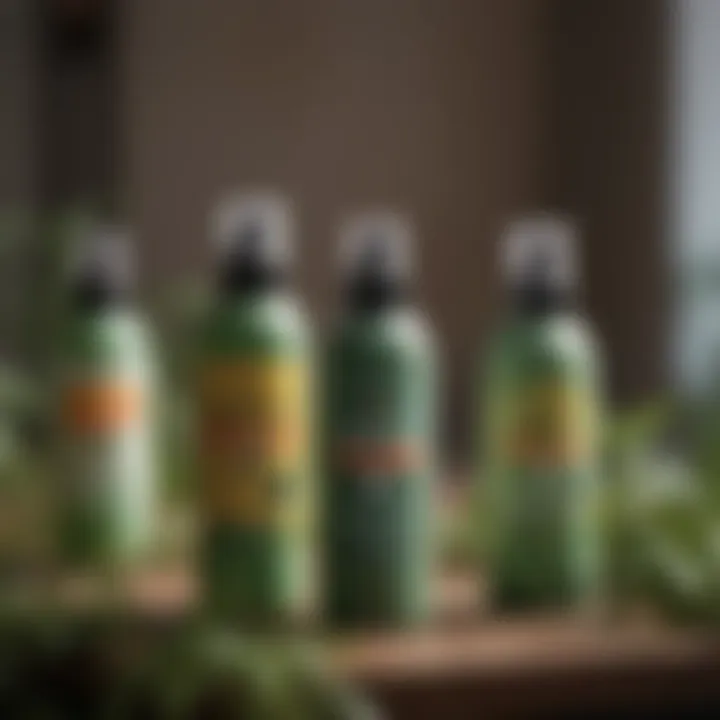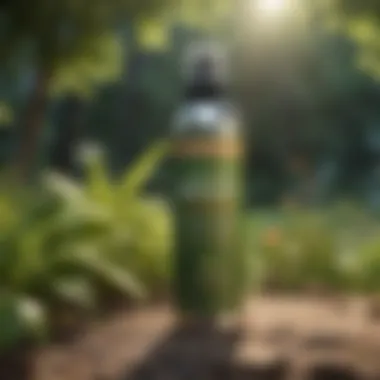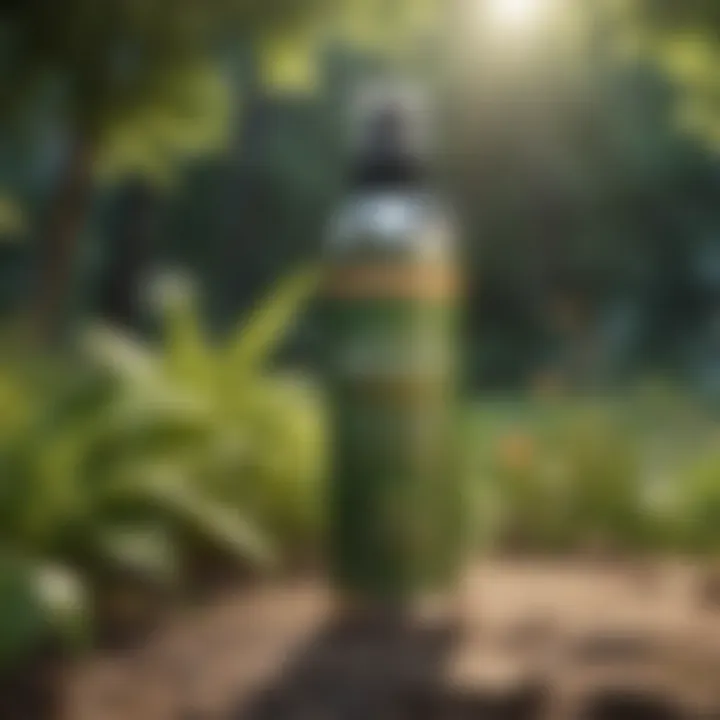Mosquito Repellent Sprays for Your Garden


Intro
As gardens increasingly serve as spaces for relaxation and social interaction, the presence of mosquitoes can greatly detract from these experiences. The importance of effective mosquito repellent sprays cannot be overstated. This guide aims to equip homeowners, gardening enthusiasts, and social hosts with the necessary information to choose and apply mosquito repellent sprays tailored for garden use.
Understanding different spray options, their active ingredients, and proper application methods is crucial. Moreover, being aware of environmental impacts and exploring natural alternatives can enhance overall outdoor enjoyment. In this article, we will discuss these topics in detail, ensuring that your gardening and entertaining can proceed without the bothersome interruption of mosquitoes.
Design Trends
Current Popular Styles
When it comes to mosquito repellent sprays, the market has seen a push towards various styles and formulations to appeal to a wide audience. This includes both synthetic chemical sprays and natural alternatives. Popular brands are now focusing on improving user experience and ensuring ease of application. There are options available in pump sprays, aerosols, and even refillable devices that can offer longer-lasting protection.
Color Palettes for Modern Spaces
While color palettes are usually associated with interior design, the visual appeal of packaging for mosquito repellent sprays is becoming increasingly sophisticated. Consumers often favor items that fit harmoniously within their outdoor space. Sleek designs with muted or earthy tones might resonate well with garden aesthetics. This attention towards design not only attracts buyers but signifies the brand's commitment to blending functionality with style.
Active Ingredients in Mosquito Repellant Sprays
Understanding the active ingredients in mosquito repellent sprays plays a significant role in making informed choices. Common ingredients include:
- DEET: A powerful chemical known for its effectiveness.
- Picaridin: Often preferred for its less greasy feel while still providing substantial protection.
- Oil of Lemon Eucalyptus: A popular natural alternative that offers decent efficacy without synthetic components.
- Permethrin: Typical for treating clothing and gear rather than directly applying to skin.
"Choosing the right active ingredient can drastically affect your experience in the garden, influencing not just effectiveness but also safety and comfort."
Application Methods
Proper application is vital for the effectiveness of any mosquito repellent. Here are common methods:
- Spraying: Directly spray on exposed skin or clothing.
- Soaking: For items like tents or outdoor fabrics, soaking fabric in permethrin is recommended.
- Diffusion Systems: These systems can disperse repellent into the air, creating a protective cloud.
Each method has its specific advantages and ideal scenarios, making it essential to consider where and how you plan to use them.
Environmental Considerations
The increasing awareness about the impact of chemicals on the environment has shaped product development. Eco-friendly options are gaining traction, appealing to consumers who wish to protect not only themselves but also the ecosystem. Always check for labels that indicate environmental responsibility.
Natural Alternatives
For those who prefer avoiding chemicals, there are effective natural repellents. Choices include:
- Citronella oil
- Lavender oil
- Tea tree oil
While these may not provide the same level of protection as DEET, they can work effectively for shorter periods and are less harmful to the surroundings.
Finale
In summary, selecting the right mosquito repellent spray for your garden involves examining various factors such as active ingredients, application methods, and environmental impact. Understanding these elements will allow homeowners to make informed choices and enjoy their outdoor spaces without the disturbance of pests. Keeping updated with new trends and available options ensures that your garden remains a haven for relaxation and social gatherings.
Prologue to Garden Mosquito Control
Managing mosquito populations in gardens is increasingly important for a pleasant outdoor environment. As gardens serve as venues for relaxation and social events, the presence of these pests can detract from the enjoyment of these spaces. Understanding how to effectively control mosquitoes is vital for creating a comfortable atmosphere.
Mosquitoes are not just nuisances; they are potential carriers of diseases. This makes it essential for homeowners to consider mosquito repellent options that are safe for people and the environment. Choosing the right strategy can significantly enhance the enjoyment and livability of garden spaces.
In this article, various topics regarding mosquito repellent sprays will be explored. These include the behavior of mosquitoes, the types of sprays available, the active ingredients, and application methods. Also, readers will learn about environmental considerations and user experiences with different products. This comprehensive examination aims to empower readers with the knowledge they need to choose suitable mosquito repellents for their gardens.
Understanding Mosquito Behavior
To effectively control mosquitoes, one must first understand their behavior. Mosquitoes tend to thrive in warm, humid environments, often gathering near standing water where they breed. They are primarily attracted to carbon dioxide and body heat, which means they are drawn to humans and animals.
Different species of mosquitoes exhibit varying behaviors. Some are more active during daylight, while others prefer dusk and night. This variability can affect how and when to apply mosquito repellents in gardens. Knowing when these pests are most active can guide effective spraying periods.
Furthermore, mosquitoes are more inclined to inhabit specific areas in gardens that provide shade and moisture. Recognizing these hotspots can inform strategic decisions about repellent application locations.
Importance of Mosquito Repellents in Gardens
Using mosquito repellents in gardens is essential for multiple reasons. First, they offer immediate relief from bites, preventing discomfort during outdoor activities. This is particularly important during gatherings or family events.
Second, mosquito repellents contribute to overall health safety. In regions where mosquito-borne diseases are prevalent, such as West Nile virus or Zika virus, using effective repellents can minimize the risk of transmission. Education about the importance of these products is crucial for homeowners.


Lastly, repellents also help create a more enjoyable outdoor atmosphere. Many people associate their gardens with relaxation and peace, which is difficult to achieve if mosquitoes are present. Using the right sprays ensures that gardens remain inviting.
"Using mosquito repellents transforms gardens into comfortable retreats."
Types of Mosquito Repellent Sprays
Understanding the types of mosquito repellent sprays is crucial for effective garden management. Different applications suit various environments and preferences, impacting both effectiveness and safety. Households often face the challenge of balancing protection against mosquitoes while ensuring that their gardens remain safe for children and pets. Knighting oneself with knowledge in this area helps homeowners select the best option for their outdoor spaces, enhancing the enjoyment and ensuring that the garden remains a pleasant area.
Chemical-Based Sprays
Chemical-based mosquito repellent sprays are popular for their quicker and often more potent effects. These sprays usually contain synthetic compounds that target the nervous systems of insects. A well-known example is DEET. Its effectiveness comes from its ability to mask human odors that attract mosquitoes, keeping them at bay for several hours after application.
However, using chemical sprays comes with considerations. First, ensure that you apply them according to the instructions on the label. Overuse may lead to skin irritation or other health concerns. Furthermore, examine the potential impact on non-target insects and surrounding wildlife. These products can sometimes harm beneficial insects or contaminate soil if misused. Homeowners need to be cautious when spraying near flowers or vegetables.
Natural Repellent Sprays
Natural repellent sprays offer a different approach. They often rely on essential oils and naturally derived ingredients to ward off mosquitoes. Common examples include citronella, eucalyptus, and lavender oils. Many people prefer these options due to their lower toxicity and pleasant fragrances. This makes them an appealing choice for families with small children or pets, as they tend to present fewer health risks compared to synthetic chemicals.
Nevertheless, the effectiveness of natural sprays can vary. While they may provide a more eco-friendly solution, their effects might not last as long as chemical alternatives. Home gardeners might find that natural sprays require more frequent application to maintain their protective effects.
In summary, choosing between chemical and natural mosquito repellent sprays depends on specific needs, garden conditions, and personal preferences. Both types have their advantages and drawbacks, making it imperative to assess which product aligns best with one’s garden care goals and the overall environment.
Active Ingredients in Mosquito Repellent Sprays
Active ingredients in mosquito repellent sprays play a critical role in determining their effectiveness. The choice of these ingredients significantly influences the spray’s ability to deter mosquitoes and protect users from potential bites. A correct understanding of the various active ingredients can lead to informed choices that address both effectiveness and safety.
Various repellents have different active components. Each active ingredient varies in terms of effectiveness, duration of protection, and potential side effects. Selecting a repellent requires considering these factors while also weighing personal preferences, such as sensitivity to certain chemicals or a preference for natural products. Understanding the specifics of these ingredients is essential for anyone looking to maintain an enjoyable outdoor space.
DEET: Overview and Effectiveness
DEET is one of the most widely used active ingredients in mosquito repellent sprays. Introduced in the 1940s, it has gained a reputation for its effectiveness against a range of biting insects, including mosquitoes. DEET works by interfering with the insect's ability to detect humans or warm-blooded animals, effectively masking our natural scents.
Benefits of DEET:
- Proven efficacy: Numerous studies have shown that DEET can provide several hours of protection.
- Wide availability: It is commonly found in various commercial products, making it accessible for consumers.
Considerations for DEET:
- Skin irritation: Some individuals may experience skin reactions, especially with higher concentrations.
- Environmental impact: DEET has raised concerns regarding its impact on aquatic systems, as it may be toxic to fish.
Picaridin: A Safer Alternative
Picaridin is regarded as a safer alternative to DEET. Its effectiveness is comparable to DEET but often preferred for its non-greasy feel and lack of odor. Picaridin does not have the same level of environmental concerns as DEET, making it appealing for eco-conscious consumers.
Advantages of Picaridin:
- Reduced irritation: Unlike DEET, it is less likely to cause skin irritation or allergic reactions.
- Long-lasting: Picaridin can offer long-lasting protection, similar to that of DEET, but with a more pleasant user experience.
Drawbacks:
- Limited historical use: While gaining popularity, it may not have the same depth of research as DEET, although studies continue to validate its efficacy.
Essential Oils: Pros and Cons
Essential oils have gained traction as natural alternatives to chemical repellents. Oils like citronella, eucalyptus, and lemongrass are commonly utilized due to their fragrance and tradition in repelling insects.
Pros of Essential Oils:
- Natural origin: For users concerned about chemical exposure, essential oils provide a natural option.
- Pleasant aroma: Many essential oils have a pleasant scent, making them preferable for personal comfort.
Cons of Essential Oils:
- Shorter duration of effectiveness: They typically require more frequent application compared to synthetic repellents.
- Variable results: Effectiveness can vary widely based on concentration and individual body chemistry, leading to inconsistent protection.
Application Methods for Garden Sprays
The application methods for mosquito repellent sprays in gardens play a critical role in the overall effectiveness of these products. Understanding the techniques used, as well as the frequency with which sprays need to be applied, can significantly impact how well homeowners are able to manage mosquito populations. Effective application ensures that the repellent is distributed uniformly, maximizing coverage and minimizing areas where mosquitoes can thrive.
Spraying Techniques: Best Practices
When it comes to applying mosquito repellent sprays, there are several key techniques that can enhance the effectiveness of the product. Here are some best practices:


- Consistency in Application: It is essential to apply the spray evenly across the targeted areas in the garden. This helps to form a barrier that mosquitoes find difficult to penetrate.
- Time of Day: Spraying in the early morning or late afternoon can be more effective than doing it in the heat of midday. Mosquitoes are often less active at these times, enabling better absorption of the product.
- Wind Considerations: Avoid applying sprays on windy days. Wind can carry the repellent away from the intended area, leading to uneven application and wasted product.
- Equipment Selection: Choose the right equipment for spraying. Handheld sprayers or backpack sprayers can be efficient for smaller gardens, while larger areas may require a pump or motorized sprayer.
Adhering to these techniques helps ensure that the repellent works as intended, providing a more mosquito-free environment for outdoor activities.
Frequency of Application
The frequency with which mosquito repellent sprays should be applied can vary based on several factors including the active ingredients used, weather conditions, and the specific garden environment. Here are four considerations:
- Active Ingredients: Products with synthetic chemicals like DEET or Picaridin may require less frequent application compared to natural sprays, which can degrade quicker under sunlight.
- Rainfall: After heavy rain, it is crucial to reapply the spray, as rain can wash away the repellent, leaving areas vulnerable once again to mosquito populations.
- Seasonal Changes: As mosquito activity tends to increase in certain seasons, regular applications during peak mosquito months (typically late spring through summer) may be necessary.
- Personal Experience: Homeowners should monitor their own experiences with mosquito presence post-application. If mosquitoes are still prevalent, more frequent applications might be warranted.
Always refer to the product label for specific instructions on how often to reapply the mosquito repellent for optimal results.
Effectiveness of Mosquito Repellent Sprays
The effectiveness of mosquito repellent sprays is a cornerstone in managing mosquito populations in garden spaces. Understanding how and why certain sprays work can make a decisive difference in ensuring a more enjoyable outdoor experience. With the right information, homeowners can make informed choices that enhance both comfort and safety in their gardens.
When assessing effectiveness, several factors come into play. These factors include the composition of the spray, environmental conditions, and user application methods. Each element influences not just the immediate impact of the spray, but also its overall efficiency over time. Therefore, understanding these constituents is vital for anyone looking to implement mosquito repellents in their garden.
Factors Affecting Effectiveness
- Active Ingredients: The active ingredients present in mosquito repellent sprays play a crucial role in how effective the product is. Ingredients like DEET, Picaridin, and essential oils can repel mosquitoes differently based on their formulation and concentration.
- Environmental Conditions: Weather conditions such as humidity, wind direction, and even temperature can affect how well a repellent works. For example, rain can wash away sprays, diminishing their effectiveness. Similarly, high winds may disperse the spray before it can make contact with mosquitoes.
- Application Method: How a repellent is applied significantly impacts its performance. Sprays that cover more surface area without oversaturation tend to work better. User technique matters, as improper application can lead to gaps that allow mosquitoes to penetrate.
- Type of Mosquito: Different mosquito species have varying levels of sensitivity to repellents. Understanding which species are present in a given area can guide product selection to maximize efficacy.
- Duration of Exposure: The time of day when you apply the spray also matters. Mosquitoes are more active during certain times, such as dawn and dusk. Sprays applied during these peak activity periods can enhance likelihood of effectiveness.
Duration of Protection Offered
The coverage duration offered by mosquito repellent sprays is another fundamental aspect to consider. On average, most chemical-based repellents provide effective protection for a few hours, whereas natural alternatives often require more frequent application.
- Chemical-Based Sprays: Products containing DEET typically offer protection for several hours, sometimes up to eight depending on the concentration. This makes them viable for extended outdoor activities.
- Natural Sprays: In contrast, natural repellents, often made with essential oils, may require reapplication every hour to maintain efficacy. Understanding this difference is essential for planning outdoor events, as timing can affect comfort.
"Selecting the right mosquito repellent is about striking a balance between safety and effectiveness. Both chemical and natural options have their place, depending on the specific needs of your garden."
- Consideration of Safety: While longer-lasting products may seem appealing, safety ought to remain a priority. Frequent exposure to potent chemicals can bring risks, especially for children and pets often found in garden settings.
By considering these factors, users can choose effective products tailored to their specific situation, enhancing their outdoor living experience while managing mosquito populations in a responsible manner.
Environmental Considerations
Understanding the environmental considerations surrounding mosquito repellent sprays is vital for every gardener. It's not just about keeping mosquitoes at bay; it's about ensuring a healthy ecosystem. When choosing a repellent, one must consider its impact on beneficial insects, soil, and water systems. These factors can substantially affect not only the health of your garden but also the broader environment.
Impact on Beneficial Insects
Beneficial insects play a key role in maintaining garden health. They include pollinators like bees and predators that control pest populations. Many chemical-based mosquito repellents do not distinguish between harmful and beneficial insects. This indiscriminate nature can lead to unnecessary harm, disrupting the ecological balance of the garden. When selecting a mosquito repellent spray, it's crucial to look for products that are designed to target only mosquitoes.
- Use alternatives: Consider natural repellents containing essential oils, as they tend to be less harmful to beneficial insects compared to synthetic chemicals.
- Research products: Check if a product has been tested and proven safe for non-target insects. EPA registration can also offer insight into a product's environmental impact.
"The loss of beneficial insects can lead to larger pest problems, increasing reliance on chemical solutions that may not be sustainable."
Effects on Soil and Water Systems
The application of mosquito repellent sprays can have profound effects on soil and water quality. Chemicals can leach into the soil and water systems, affecting not only plants but also aquatic life. Some common chemicals found in repellent sprays can be toxic to fish and other aquatic organisms when they enter local waterways.
- Avoid runoff: Ensure that sprays are applied thoughtfully, preventing them from reaching water sources or flowing into drainage systems.
- Consider soil health: Products with organic or biodegradable ingredients typically pose less risk to soil health compared to those with persistent chemicals, which may accumulate and alter soil chemistry over time.
In summary, while mosquito control is important, it must not come at the expense of overall garden health. Homeowners should prioritize environmental considerations when selecting mosquito repellent sprays. By making informed choices, one can protect both their garden and the ecosystem.
Alternative Mosquito Control Solutions
As awareness of the potential hazards associated with chemical agents grows, many garden enthusiasts are eager to explore alternative solutions for mosquito control. These methods can reduce reliance on chemical mosquito repellents while still providing effective protection. Understanding alternative mosquito control solutions highlights their benefits, considerations, and practical applications in the garden environment.
Natural Barriers and Repellents
Using natural barriers in gardens can effectively deter mosquitoes without the use of synthetic chemicals. Barriers may include physical obstacles, such as screens and netting, which serve to keep mosquitoes away from gathering areas. These methods are particularly beneficial for patios or areas where people frequently congregate.
In addition to physical barriers, there are several natural repellents that can be utilized. For instance, citronella oil is widely recognized for its repellent properties. When used in candles or diffusers, it can help create a less inviting environment for mosquitoes. Other natural oils such as eucalyptus, lavender, and lemongrass also possess insect-repelling qualities.
Furthermore, ensuring proper drainage and removing stagnant water from the garden is crucial. Mosquitoes breed in standing water, therefore, eliminating sources like bird baths or clogged gutters lowers their population significantly.
Use of Mosquito-Repelling Plants
Incorporating mosquito-repelling plants into your garden is another effective alternative. Certain plants have inherent properties that repel mosquitoes while enhancing the garden's aesthetic appeal. Examples include:


- Marigolds: These vibrant flowers not only beautify the garden but also naturally repel mosquitoes and other pests due to compounds released into the air.
- Basil: The strong scent of basil can keep mosquitoes at bay. It is also a useful herb in cooking, adding dual value to your garden.
- Catnip: Research indicates that catnip oil is significantly more effective in repelling mosquitoes than DEET.
- Rosemary: This herb is both culinary and ornamental. Its aroma deters mosquitoes, making it a good addition to gardens.
Adding these plants not only helps control mosquito populations but also promotes biodiversity in the garden, creating a more balanced ecosystem.
By taking a multifaceted approach that includes natural barriers and cultivating mosquito-repelling plants, homeowners can effectively manage mosquito presence while fostering an inviting outdoor environment.
Safety Precautions When Using Repellents
Using mosquito repellent sprays in your garden is essential for comfort. However, it is also necessary to prioritize safety when using these products. Mosquito repellents can have strong chemicals or natural ingredients that may cause adverse reactions if not used correctly. Understanding the safety aspects of these products ensures that you create a pleasant outdoor experience without compromising your health or that of the environment.
Understanding Toxicity Levels
When selecting a mosquito repellent spray, it is vital to understand the toxicity levels associated with its active ingredients. Some chemicals, like DEET, are widely used and recognized for their effectiveness. However, they can also pose risks if misapplied or overused. For instance, excessive exposure can lead to skin irritation or respiratory problems. Additionally, some natural ingredients may still cause allergic reactions in sensitive individuals.
"Always check the label for toxicity levels and warnings before use."
Here are some key points to consider regarding toxicity:
- Active Ingredients: Know the active ingredients and their concentrations. Higher concentrations may offer more effectiveness but can also increase toxic risks.
- Personal Sensitivity: Each person may react differently to various ingredients. Testing a small area of skin can help gauge individual sensitivity.
- Environment Impact: Some repellents can affect non-target species. Always consider how the product will impact beneficial insects.
Storage and Handling Considerations
Proper storage and handling of mosquito repellent sprays are crucial. Poor practices in these areas can lead to accidents, reduced effectiveness, or health hazards. Here are several considerations to keep in mind:
- Keep Out of Reach: Store repellents away from children and pets. Even natural products can be unsafe if ingested or misapplied.
- Temperature Control: Store in a cool, dry place. Extreme heat can compromise the formula, reducing effectiveness and possibly leading to toxicity.
- Original Containers: Always keep products in their original containers to prevent confusion about their use.
- Check Expiry Dates: Regularly check products for expiry or degradation signs. Using expired products may decrease the desired effectiveness.
Implementing proper safety precautions when using mosquito repellent sprays ensures the well-being of both users and the surrounding environment. The choice of the right product and the adherence to safety protocols contribute to a more enjoyable garden experience.
User Experiences and Reviews
User experiences and reviews are crucial components when selecting a mosquito repellent spray for the garden. They provide real-world insights into the effectiveness, usability, and overall satisfaction of various products. Gardeners and homeowners often seek guidance based on personal experiences rather than just advertising claims. This section will explore the value of user feedback and what potential buyers should consider.
Personal testimonials can reveal a lot about how well a spray performs in different environments. For example, factors such as humidity, types of plants, and layout of the garden can influence how effectively a repellent works. Additionally, understanding the challenges and successes faced by others can assist individuals in making informed choices. Moreover, user reviews often highlight any adverse effects or safety concerns that may not be evident from product descriptions.
**"Real-life experiences provide clarity that marketing often omits."
Comparative Analysis of Popular Brands
When evaluating mosquito repellent sprays, comparing popular brands is essential. Each brand offers unique formulations and promises different levels of efficacy. Some of the notable brands include Off!, Repel, and Cutter. Here’s how they stand out:
- Off!: Known for a wide range of products, Off! utilizes DEET and other active ingredients. Users often commend its long-lasting effects but caution about the potential for skin irritation.
- Repel: This brand focuses on plant-based ingredients, appealing to those looking for natural options. Feedback indicates that while it may require more frequent applications, it is gentler on the skin.
- Cutter: Many users appreciate Cutter for its affordability without compromising effectiveness. Its formulas often include Picaridin, which garners favorable reviews for being less pungent than DEET.
The verdict often lies in personal preference and specific garden conditions. Some users may prioritize natural ingredients, while others might prefer proven chemical solutions.
Long-term User Feedback
Long-term user feedback is invaluable for anyone considering a mosquito repellent spray. This type of feedback can provide insights into how well a product performs over time, particularly under various weather conditions. Users report on the durability of protection and the practical aspects of use, such as ease of application and value for money.
Many reviewers share their experiences several months after initial use, discussing whether the product met their expectations across seasons. Some common points highlighted in long-term reviews include:
- Effectiveness: Users often note whether the spray continues to repel mosquitoes effectively throughout its specified duration.
- Skin Reactions: Feedback often includes information about any rashes or allergic reactions experienced after extended use.
- Environmental Impact: Given the increasing concern for eco-friendliness, long-term users frequently discuss if they notice any changes in beneficial insect populations in their gardens after prolonged use of specific repellents.
These elements are essential when considering which mosquito repellent spray will not only work well but also suit the individual’s lifestyle and garden environment. By integrating long-term user feedback into the decision-making process, potential buyers can select products that are more likely to meet their specific needs.
Culmination and Recommendations
The conclusion is a vital part of this article as it synthesizes the information discussed and provides guidance on the practical applications of mosquito repellent sprays in gardens. Understanding how to select the right products can greatly enhance outdoor experiences, especially in environments where mosquitoes can disrupt tranquility.
Choosing the Right Product for Your Garden
When it comes to selecting a mosquito repellent spray, several factors should be taken into consideration. First, you should assess the specific needs of your garden. For instance, consider the size of your garden, the local mosquito population, and any nearby water sources where mosquitoes may breed.
Additionally, the type of active ingredient is important. For instance, DEET-based products are known for their effectiveness but may not be suitable for everyone due to their chemical nature. On the other hand, products with essential oils might be more environmentally friendly but may require more frequent application for similar effectiveness.
- Considerations:
- Your garden's size and layout
- Local mosquito types
- Safety for pets and children
- Environmental impact
Engaging with fellow homeowners or enthusiasts via platforms like Reddit can be valuable. Sharing experiences about specific products can help make an informed decision. Furthermore, reading user reviews online can also provide insights on effectiveness and application ease.
Future Trends in Mosquito Control
The field of mosquito control is evolving. Increasing awareness of environmental concerns is leading to innovative solutions. Natural repellents and bio-based sprays are becoming more popular, focusing on less harmful substances.
Research is ongoing in areas such as genetic modification of mosquitoes and the use of drones for spraying in hard-to-reach areas. These trends signify a shift towards more targeted assault on mosquito populations, minimizing the ecological footprint of control methods.
"Innovation will not just enhance mosquito control but also promote a healthier garden ecosystem."















